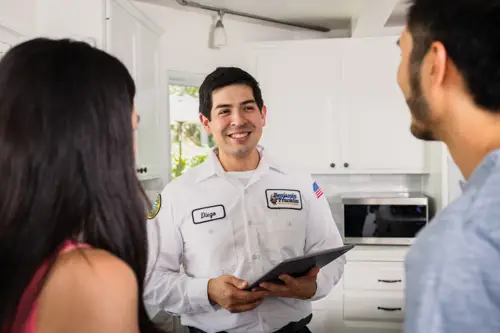
A good water heater can significantly improve your home’s energy usage. In fact, water heaters consume an average of 18% of your home’s energy consumption. However, you don’t want to simply get the smallest water heater available. The best option also provides enough hot water for your family.
How To Choose an Energy-Efficient Water Heater
At Benjamin Franklin Plumbing, we can help you choose the right water heater for your home. In general, we find that heat pump water heaters (HPWHs) and tankless water heaters are the most efficient options for homeowners. Before you invest in getting a new water heater, learn more about different types.
Tankless Water Heaters
With a tankless water heater, you can get hot water whenever you need it. Instead of having a tank, these water heaters are designed to heat water as it is used. In most homes, this results in significant cost savings because you don’t have to worry about keeping an entire tank of water warm throughout the day and night.
HPWHs
An HPWH uses a heat pump to warm the water supply. Basically, it moves water from one place to another to absorb heat. They function through the same technology that your refrigerator uses to stay cold. Typically, HPWHs can heat water with 30% to 50% less energy than a conventional water heater.
Conventional Water Heaters
When most people think about water heaters, they’re normally thinking about conventional water heaters. A conventional water heater uses a storage tank to heat and store water. The number of gallons the tank holds must match the size of your home and the number of people in it. If you have a particularly large family or many house guests, your existing storage tank may not be large enough to fulfill your water requirements.
Solar Water Heaters
Solar water heaters are able to heat water using the sun. If this is an option for your home, it can save you a significant amount of money on your energy bill. Thanks to the extremely effective insulation these water heaters use, these systems are even able to work during the wintertime.
How Can an HPWH Save on Energy Costs?
Your water heater uses more energy than all of your refrigeration and cooking needs combined. Traditional water heaters require a lot of energy, which leads to higher utility bills. With a heat pump-based system, a compressor uses heat from the atmosphere to warm the tank. This results in significant cost savings for the average American home.
In fact, the average American household can expect to save around $270 to $550 per year on energy costs by getting an HPWH. During the lifetime of your HPWH, this works out to $2,050 to $5,610 in savings.
What To Consider When Choosing a Water Heater
While energy efficiency is a major factor when selecting a water heater, it isn’t the only factor. Think about the following considerations before you buy a new water heater.
- Size: The water heater’s capacity is based on the size of your home, the number of people in your family, and the amount of hot water you normally use.
- Cost: As you consider different water heaters, it’s important to think about the total cost. A good warranty or special discounts can also impact the total cost.
- Fuel type: If your home is only set up for an electric water heater, you should probably get an electric water heater. Otherwise, you will end up spending a lot of money setting up your home to use gas. For new homes, you should consider the efficiency and availability of different fuel types.
- Energy efficiency: Even if a water heater costs more upfront, you may still spend less in the long run by getting it. If a water heater uses less energy, you’ll recuperate your upfront investment over time by spending less money on your energy bill each month.
Start Saving Money on Your Utility Costs
By investing in an energy-efficient water heater, you can save a significant amount of money on your energy bills each month. Additionally, these water heaters can reduce your carbon footprint. To learn more about the best water heaters for your home, reach out to Benjamin Franklin Plumbing today.